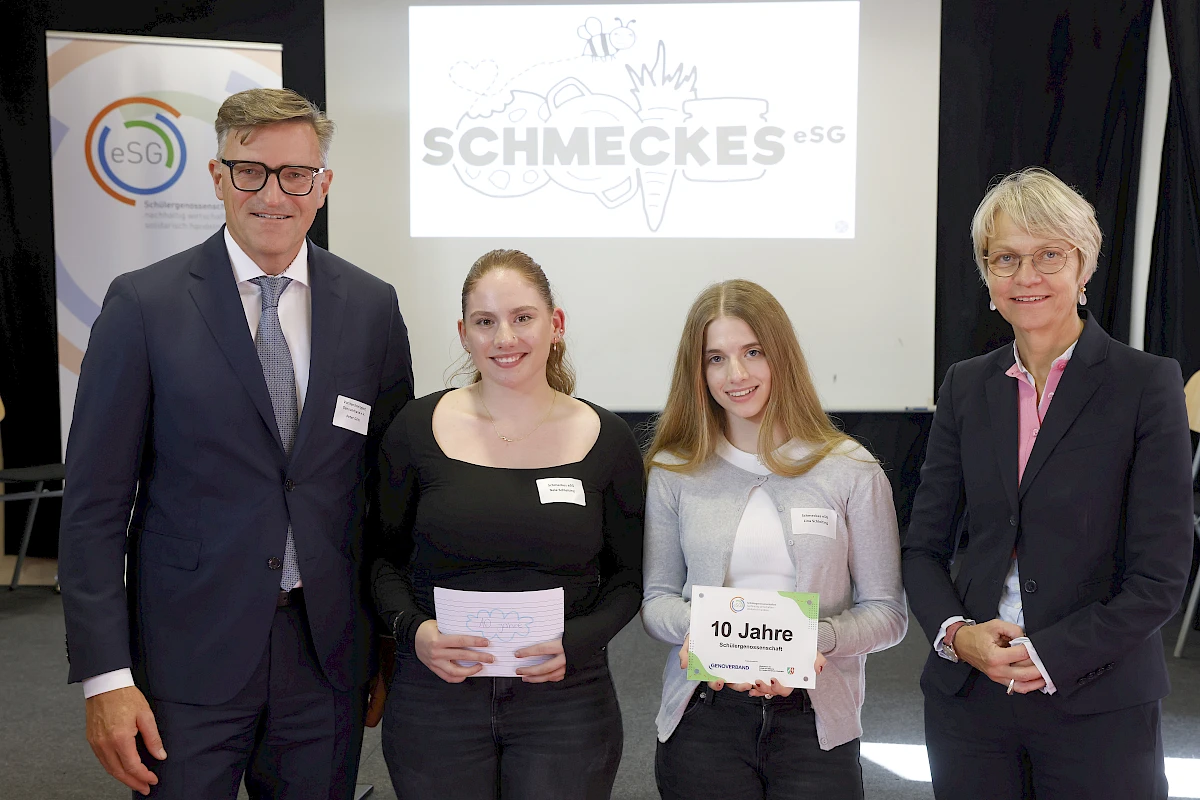OBERHAUSEN, September 20, 2025 –– With around 80 student cooperatives operating alongside their partner cooperatives across all regions of North Rhine-Westphalia, numerous awards and competition successes, and the Education Minister herself as patron, the cooperation between the NRW Ministry of Education and the Genoverband e. V. has proven a major success. The initiative was launched ten years ago to promote the project “Student Cooperatives – Sustainable Business, Acting in Solidarity.”
This milestone anniversary was celebrated recently at the Weierheide Comprehensive School in Oberhausen by Education Minister and patron Dorothee Feller, alongside Peter Götz, board member of the Genoverband. Eleven other student cooperatives from across NRW and their partner cooperatives were also invited to the event, which was hosted and moderated by the student cooperative Schmeckes eG.
In her welcoming address, Minister Dorothee Feller emphasised the social value of student cooperatives:
“Student cooperatives fulfil an important societal function. Pupils learn to take on responsibility, work together on shared projects, and consider the interests and perspectives of others – always with the common good in mind. This makes student cooperatives a key component in promoting democratic competence, which is especially vital in today’s world.”
Peter Götz thanked the Minister for her strong support of the student cooperatives initiative. He highlighted the value of these projects in preparing students for the world of work and life beyond school.
“With the student cooperatives programme, schools become workshops for life from Year 7 onwards. Students learn to take responsibility together, create innovative business models, operate sustainably, and explore career paths. Within the safe environment of the school, they also practise entrepreneurship – democratically and cooperatively, full of ideas, and as role models for the next generation.”
Eight student cooperatives honoured
Together, Minister Feller and Peter Götz honoured eight student cooperatives from NRW for their successful business models, presenting them with certificates and plaques designed by the student cooperative Jungköpfe from Carl-Severing College for Business and Administration in Bielefeld.
The awarded cooperatives were:
- Auszeit eSG, Nelson Mandela Comprehensive School, Greven – Supplies students and staff with regional, healthy food and drinks such as sandwiches, yoghurt, pancakes, and snacks.
- Essbar eSG, Anne Frank Secondary School, Greven – Sells healthy and sustainable products during school breaks.
- Keppels Früchtchen eSG, Stift Keppel Grammar School, Siegen – Sells school supplies and produces apple juice from the school’s own apple trees.
- MMGE Bienenprodukte, Maria Montessori Comprehensive School, Meerbusch – Manages school beehives and produces honey.
- PAB Association eSG, Peter-August-Böckstiegel Comprehensive School, Borgholzhausen – Produces items including honey, beeswax products, nesting boxes, and regional apple juice.
- The Honeybee Industrie eSG, Straelen Municipal Grammar School – Beekeeping and honey production.
- UpperClassEvents eSG, Vocational College, Höxter District – Plans and organises school events.
- Wear it eSG, Israhel-van-Meckenem Secondary School, Bocholt – Designs, produces and sells school-branded clothing.
Panel Discussion: What Makes Student Cooperatives Successful?
A panel discussion followed, where representatives of student and partner cooperatives spoke with Tristan Heermann, NRW’s state coordinator for student cooperatives, about the key success factors behind the partnership model. Local partner cooperatives – such as regional cooperative banks – provide valuable support to student cooperatives, particularly in business and cooperative matters.
What Are Student Cooperatives?
Student cooperatives are educational projects in which pupils set up and run sustainable businesses within the school setting, inspired by the cooperative model. They work together independently and democratically within a structured learning programme, developing their own business ideas and financial plans, taking responsibility, managing processes, organising teamwork, and gaining insights into economic, social, and environmental interconnections.
The business activities of student cooperatives range from operating school kiosks and selling school supplies to organising events and producing food items like honey, apple juice, or chocolates. Pupils also gain hands-on experience in areas such as procurement, sales, accounting, management, and event planning.
In August 2025, the Student Cooperatives project received the National Award for Education for Sustainable Development, jointly issued by the German UNESCO Commission and the Federal Ministry of Education. The award recognises the project’s high-quality educational approach and its lasting contribution to sustainable development.
The Genoverband continues to support student cooperatives in NRW in partnership with the Ministry of Schools and Education.
https://thecooperator.news/lessons-cooperatives-in-uganda-can-learn-from-germany/
Buy your copy of thecooperator magazine from one of our country-wide vending points or an e-copy on emag.thecooperator.news
